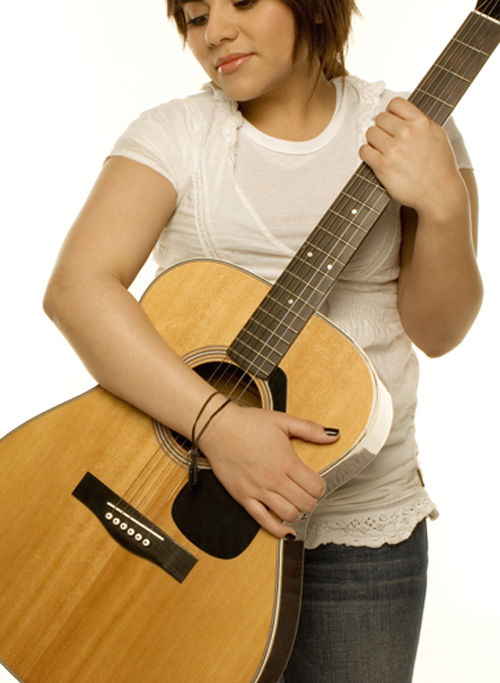

Stop 1 - Choosing Your First Guitar
Let's assume you haven't bought (or borrowed, or found) a guitar yet.
But you need one if you want to learn how to play it. What should you do?
Should you use your dad's old clunker that's been sitting in the basement for the last 10 years? Should you go down to the local music store and put down a few hundred dollars and get something worthy of your talents. Should you read the reviews on Amazon and get the guitar most people seem to like?
Wait!! Don't do any of those things!
Here are 5 things to consider...
1. Big and Bulky is not good
Guitars are not all the same size. They range in size from little 1/2 and 3/4 size guitars for children all the way up to jumbo guitars like country singers sometimes use.
Starting on a guitar that is too large will just add to the frustration, mostly because you will find it difficult to find a comfortable sitting position, and you'll constantly bump the guitar into the chair, the table, the floor.
Heavy is not good either. It is surprising to non-guitar players how heavy a solid-body electric guitar often is. That is a pretty good reason not to start on one. I mention a few others in point 5, Acoustic is better for starters.
2. Avoid a Big, Fat Neck
Not all guitar necks are the same. Some are wider and fatter than others. Make sure the neck fits your hand. It should feel comfortable when you wrap your fingers around it and press on the frets. Moving your hand up and down the neck should feel smooth and natural.
3. Nylon Strings are easier to play
Most guitar players just automatically think they should be playing with metal strings. But for a beginner metal strings are hard on the fingers and playing can be painful.
Start with nylon strings - like you find in all classical guitars. You can change later when you get past the beginner stage. In fact you'll probably want a better guitar at that stage anyway, and you'll be in a much better position to know what to get.
4. Keeping it in tune is important
Learning how to tune your guitar is one of the things you should learn very early in your career. When your instrument is not tuned properly it will sound "off", and sometimes you may find it difficult to keep it in tune.
Having a guitar that won't stay in tune can be pretty frustrating. Sometimes changing the strings will help. Temperature will also affect your strings. But tuning problems might also be caused by poor tuning pegs.
Under-sized guitars - the kind usually sold to children - like so-called 1/2 and 3/4 sized guitars seem to be harder to keep in tune. Just be aware that if you start out on one of these it may need regular tweaking, and it may never sound "perfect".
5. Acoustic is better for starters
Electric guitars are cool, there's no doubt about that. But to learn guitar basics it's usually better to start on an acoustic. Electrics are usually much heavier and harder to handle. You'll need an amplifier with a power source. You'll also need a cord between the guitar and the amp. And you won't be able to move around as easily - you'll be restricted to playing somewhere near the amp.
You might also spend too much of your valuable practice time playing around with the amp. This can be interesting and useful as you progress in your playing ability. But at the beginning you're better to stick with the basics.
P-R-A-C-T-I-C-E.
To make a long story short, make sure to get a guitar you are going to like practicing on. How good you get at the guitar and how quickly you get there are directly related to the amount of practicing you do.
Good Luck and "May the Guitar Gods be With You."